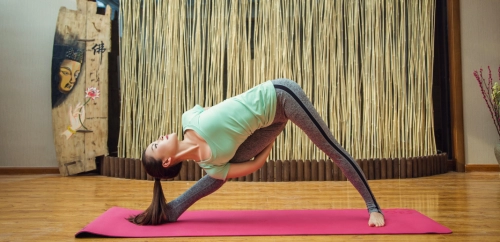What Does Yoga Do To Your Body & Brain?

With the hectic fast-paced world we live in today, it is easy to find yourself anxious and stressed out at every turn. This keeps your body in a constant state of fight or flight mode, which can lead to severe health issues both physically and mentally. To combat this, many people turn to alternative methods of treatment including meditation and yoga.
Yoga helps you enter a calmer state of mind. It reduces heart rate, stress, and anxiety, and improves focus and patience, all of which contribute to a more positive mental state. Yoga can assist in relieving muscle pain while also improving flexibility and balance.
In fact, one of the most popular traditions to embrace is yoga. By adding a yoga practice to your daily routine, you can impact the health of both your body and your mind. We want to share with you why this is. So, keep reading, and we will take an in-depth look at the brain and body connection when it comes to yoga.
Yoga & the Brain/Body Connection
Yoga has been practiced for millennia. Derived from the Sanskrit word “Yuji” yoga looks to unite your body and mind into one force for a more balanced life. A good yoga practice will incorporate specific movements with breath work to align your body’s chakras into perfect alignment.
There are many different types of yoga, but they all utilize poses, also known as asanas, to help strengthen muscles and bones. The mind-body connection is due to the connection built between all of the senses during the practice.
Many of the poses and the pace of the yoga practice allow your body time to contemplate the world around you while also stretching and moving your body. This creates a level of connection unlike any other type of physical activity.
Making Us Happy – Yoga Practice Can Change Your Mood!
There have been many studies over the last few decades on the effects of yoga on your mood, both in a physical capacity and a mental one. There are many scientific reasons why this is.
One idea is that it has to do with the fact that your heart rate changes consistently along with the signals sent through the vagus nerve. This has been shown to leave a person who has a consistent yoga practice with a more compassionate and patient personality, which tends to lead to a happier life.
Yoga also impacts your brain chemistry in a positive light. As you get older, the gray matter in your brain begins to deteriorate, and this leaves many with memory loss and a change of attitude.
The region of the brain that is most often affected by the deterioration is the one directly related to states of positive emotions like happiness. But there have been studies that show that for people who have a routine yoga practice, this deterioration is reduced.
The brain and the chemicals created from the signals that arrive at it are related to happiness and positive emotions. One reason for this could be that there is an increase in activity in both the cingulate and medial prefrontal cortex when doing yoga.
These two regions of the brain are responsible for things like gratitude and empathy. Basically, this means the more you stick to your yoga practice, the more positive emotions will be present in your life.
Now that we have an idea of how it affects our brain chemistry let’s look at the benefits for both the mind and body…
Benefits For the Body
The deliberate movement and pace of your yoga practice can serve to alleviate pain in certain regions of your body as well as strengthen others. Here are some of the biggest benefits you can experience by including yoga in your daily life.
Reduces Lower Back Pain
There are two parts of a good yoga practice that will help with the reduction of lower back pain. The meditation aspect of the practice can help relax the body and therefore relieve some of the tension. Yoga also works to improve core strength which will also help reduce lower back pain.
Body Awareness
Yoga utilizes both large and small muscle groups. Because of the poses being designed to work select muscles, you will eventually get to know your body better. This can lead to decreased injuries and even allow you to have more energy in your daily activities.
Helps With Fatigue & Sleep
Many people have trouble with their energy levels and sleep cycles. But if you have a good yoga practice, you will be able to get your heart rate up, which in turn will help give you energy throughout the day. On the other hand, you will effectively use that energy up, which can also help you sleep better in the evenings too!
Improves Balance
There are many asanas that have to do with balancing your body. These are specifically designed to help improve your body's stability. Yoga can help even those with mobility issues to improve their overall balance.
Helps Heart Health
Yoga is designed to be a low-impact exercise but one that focuses on aerobic capabilities. This means it lowers the heart rate and this can relieve stress on the heart.
Betters Flexibility
Flexibility is important to your overall physical health. Yoga and its poses will help increase your flexibility. This will also help with range of motion and that will reduce risks of injury during strenuous activities!
Benefits For the Mind
Because of the regions of the brain that are affected when utilizing yoga in your weekly health routines, you can experience a ton of benefits when it comes to your emotions and cognitive abilities.
Boosts Mood
The combination of breath work with the stimulation of the vagus nerve has been shown to be able to improve the mood of someone who adds a regular yoga practice into their lives. This will help increase the production of certain neurotransmitters, which, in turn, will boost their mood.
Relaxation
The use of breathing techniques throughout the position changes helps relieve tension in your body. This relief will give the yoga practitioner a sense of relaxation and calm. By being in this state of calmness, tension and anxiety will be reduced, producing an even deeper sense of relaxation.
Increases Focus
To execute a yoga practice properly, you have to be able to focus on your body’s position and breathing. Because of this, you may find that your exhibit better focuses on other areas of your life as well.
Improves Resilience
Yoga is not an easy practice to master. You have to be able to take a little stress when it comes to trying new positions. This can lead to even better resilience when it comes to a whole wealth of aspects of your life. It builds resilience and gives the person the ability to adapt easier.
Good to Cool Down
Yoga is a great practice to include at the end of a heavy workout. The concentrated movements and breath can help bring down your heart rate in a very healthy way that improves your overall health.
Final Thoughts
No matter what discipline you choose when it comes to your yoga practice, there are a lot of benefits you can take advantage of for both your physical and mental health. The constant concentration it takes to execute positions properly and the deep breath work affects regions of the brain that trigger positive emotions making yoga practitioners happier in all areas of their life.
That coupled with the use of muscle groups, both small and large, ensures that yoga is a complete practice that helps bring your mind, body, and spirit into alignment with your own personal world as well as the one around you.














